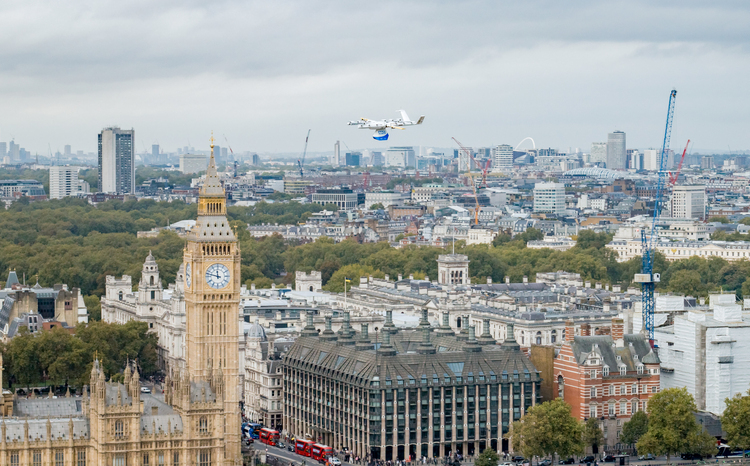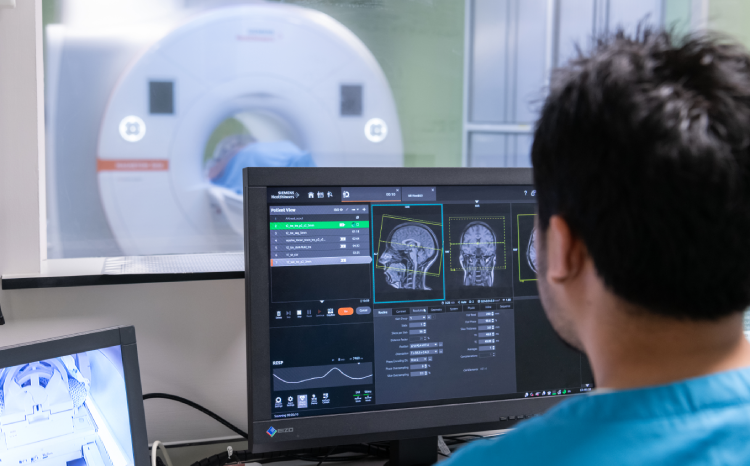Drones deliver urgent blood samples for Guy’s and St Thomas’
- 15 November 2024

- The first electric drones have successfully transported urgent blood samples in a landmark first for the NHS in London
- The six-month pilot, which began in October 2024 and runs until spring 2025, is a partnership between Guy's and St Thomas' NHS Foundation Trust, Apian and Wing
- Moving samples between Guy’s Hospital and the St Thomas’ Hospital lab can take more than 30 minutes by road but less than two minutes by drone
Urgent blood samples are being transported by electric drones at Guy’s and St Thomas’ NHS Foundation Trust, in a medical delivery service which aims to improve patient care by speeding up testing turnaround times.
The six-month trial, which began in October 2024 and is expected to run until spring 2025, involves the delivery of blood samples for patients undergoing surgery who are at high risk of complications from bleeding disorders.
Moving samples between Synnovis’ lab at Guy’s Hospital and the lab at St Thomas’ hospital can take more than 30 minutes by road but takes less than two minutes by drone, enabling faster analysis and helping to efficiently determine whether patients are safe to undergo surgery or be discharged.
Lawrence Tallon, deputy chief executive of Guy’s and St Thomas’, said: “This drone trial to deliver blood samples should speed up test results for some of our most vulnerable patients, ensuring they have the very best care.
“It combines innovations in healthcare with sustainability to give us an NHS fit for the future.”
The pilot, announced in September 2024, was organised in partnership with healthcare logistics company Apian and Wing, a global drone delivery company that is part of Google’s parent company, Alphabet.
It is being regulated by the Civil Aviation Authority, which granted airspace approval and the air traffic management service NATS is ensuring the service operates safely alongside crewed aircraft.
Alexander Trewby, chief executive and cofounder of Apian, said: “Cities like London face a unique challenge: built vertically but relying on 2D roads, they’re choked by polluting congestion.
“Apian’s ambition is to create an autonomous delivery network operating at NHS scale, moving physical items as productively as the internet moves information.”
Professor Dominic Harrington, chief scientific officer at Synnovis, said: “Tens of thousands of essential patient samples are analysed by pathology laboratories across London each week.
“Reducing the time it takes to transport these samples means results are available more quickly to inform best possible patient care.”
A spokesperson for Guy’s and St Thomas confirmed in September that the service would not be affected by the cyber attack on Synnovis in June 2024, which caused months of disruption to pathology services at the trust.
The switch to drone deliveries will have environmental benefits by removing carbon emissions and reducing traffic congestion.
Courtney Johnk, global partnerships and healthcare at Wing, said: “We’re pleased to be fully operational in central London, delivering patient blood samples by Wing drones on-demand on weekdays.
“The efficiencies gained for patient care by transporting multiple samples by air as needed, rather than through ground traffic, are already becoming clear.
“It’s exciting to see drone delivery is now integrated as a regular part of healthcare logistics at Guy’s and St Thomas’ NHS Foundation Trust.”
Results of a study in Northumbria by NHS Blood and Transplant and Apian, published in the British Journal of Haematology in April 2024, found that drones can be used as a safe mode of transport for delivering blood packs.





